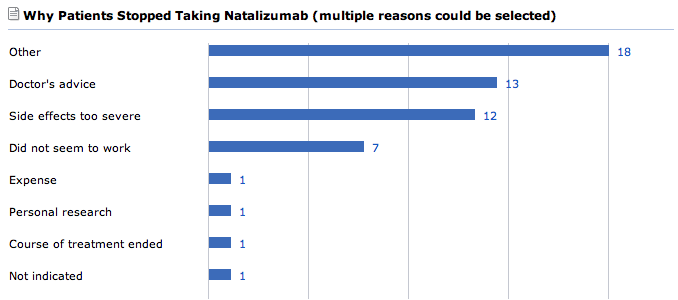 Members of our Multiple Sclerosis (MS) community have been discussing this story in the Boston Globe which reports severe adverse events experienced by two European MS patients on the drug Tysabri (Natalizumab). Tysabri is a monoclonal antibody which seems to have a potent effect on MS; the original trial published in the New England Journal of Medicine reported that compared to placebo, MS patients on Tysabri had a 42% lower risk of sustained disability progression over two years, and a 68% reduction in the risk of clinical relapse at one year. Compared to the small and imperceptible benefits from other drugs available at the time, this provided real hope for thousands of patients.
Members of our Multiple Sclerosis (MS) community have been discussing this story in the Boston Globe which reports severe adverse events experienced by two European MS patients on the drug Tysabri (Natalizumab). Tysabri is a monoclonal antibody which seems to have a potent effect on MS; the original trial published in the New England Journal of Medicine reported that compared to placebo, MS patients on Tysabri had a 42% lower risk of sustained disability progression over two years, and a 68% reduction in the risk of clinical relapse at one year. Compared to the small and imperceptible benefits from other drugs available at the time, this provided real hope for thousands of patients.
Tysabri was voluntarily withdrawn in 2005, however, after a small number of cases of a rare condition called progressive multifocal leukoencephalopathy (PML). This extremely rare but usually fatal adverse event seemed particularly prone to happen in patients also taking immunosuppressive drugs; part of the standard toolkit in treating MS. It was reintroduced in 2006 but only within a strict protocol to minimize the risk of adverse events.

Since the early days of our MS community, Tysabri has been a hot topic of conversation with several patients reporting that their frequency of relapses had dropped substantially and even that some of their symptoms such as bladder dysfunction had improved too. In total, PatientsLikeMe has 297 patients taking Tysabri, although 35 patients stopped taking it, with the most common reasons being doctor’s advice, side effects, or a perceived lack of efficacy. By recording symptoms on their profile pages, our users inform each other about their experiences with Tysabri. Each patient, then is better informed to make their own decision; and by sharing their outcomes they help the whole community to make an informed choice, too.
The one question on the minds of our MS users is “now what”? A disease like MS is hard to understand for those that don’t have it, it’s an “invisible illness” characterized by fatigue, cognitive problems, and pain. When you have symptoms like this impacting upon your quality of life, how can you make the right choice? Given that nothing in our lives is risk free, what is an acceptable balance of risk between relief from suffering for several years and a small risk of death from an adverse event?
Faced with worsening symptoms, empowered patients educate themselves about the potential risks of any treatment; and along with their doctors make the choice that’s right for them. One of our MS members puts it this way:
I understand those who want the PML issue to be understood because it is a very scary thing, but I said to myself that I'd rather fight back with the strongest drug now instead of waiting for that flare up that one day is irreversible.
That is a person who is trying to make the best health care decision based on all of the available information. The choice is yours and we understand it's not an easy one to make.
